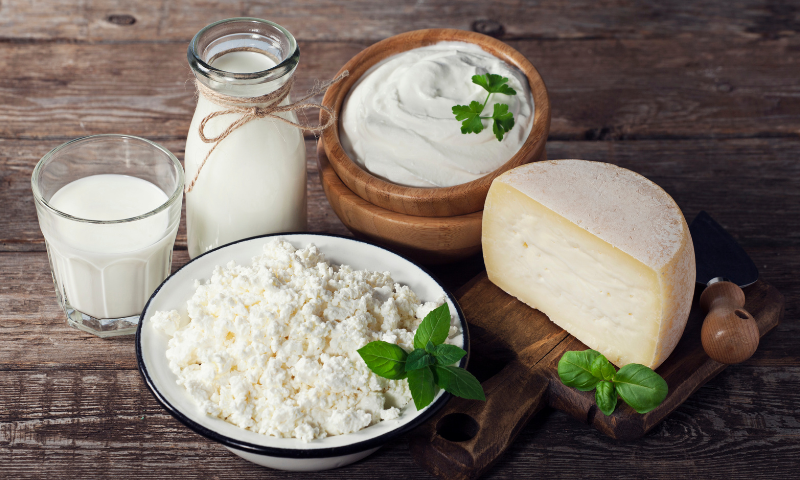Cold milk, creamy yogurt, tasty cheese sticks… Dairy can be the perfect addition to any snack! Besides their great taste, dairy products offer a lot of health benefits in moderation. Use them to help round out your diet while taking advantage of the nutrients they provide.
Health Benefits of Dairy
Calcium
Dairy foods are great sources of calcium, which is a necessary nutrient. Your body needs calcium to build and maintain strong bones. In fact, 99% of the body’s calcium is in the bones and teeth. Your heart, muscles and nerves also need calcium to function properly as it plays a role in muscle contraction, blood clotting and other critical processes.
How Much Calcium Do I Need?
Your calcium needs change as you go through different life stages. The Recommended Daily Allowance (RDA) for adults ages 19-50 is 1,000 mg per day. Males within the ages of 51-70 need 1,000 mg daily, but women within the same age group need 1,200 mg daily. Those who are pregnant or breastfeeding need between 1,000 – 1,300 mg daily, and those who have had bariatric surgery require 1,200 – 1,500 mg daily. Talk to a healthcare provider or dietitian if you have questions regarding your recommended calcium intake.
Besides dairy, other sources of calcium include:
- Leafy greens like collards, mustard greens, kale, spinach and Bok choy
- Canned sardines and salmon
- Calcium-fortified orange juice
- Soybeans; tofu
- Winter squash
Calcium in Popular Dairy Foods
- 1 glass of milk – approximately 300 mg
- 1 cup of yogurt – approximately 450 mg
- ½ cup cottage cheese – approximately 65 mg
- 1 ounce of hard cheese – approximately 200 mg
- 1 cup chopped Kale – approximately 100 mg
- 1 cup almonds – approximately 250 mg
More Health Benefits of Dairy
There’s a lot more to dairy than just calcium! Dairy foods are rich in other nutrients as well, such as vitamin D and potassium. Vitamin D is a fat-soluble vitamin that helps the body absorb and retain calcium and phosphorus, which are critical to building bone. Potassium has been shown to reduce blood pressure and the risk for cardiovascular disease.
Protein
Dairy is an excellent source of protein, which is an important building block of bones, muscles, cartilage and skin. You need protein to repair cells and make new ones, build and maintain body mass, and even regulate hormones. Protein also helps with curbing your hunger in-between meals, which can assist with weight management.
Each cup of milk contains about eight grams of protein. Cheese and yogurt can have up to 10 grams of protein per serving, and cottage cheese has about 14 grams per half-cup. Take to a healthcare provider or dietitian if you have questions about your specific protein needs.
Probiotics
More focus has been put on probiotics over the last few years. Probiotics are live microorganisms that have health benefits when consumed. We all have a mix of microorganisms in our body – trillions – that make up our gut microbiome. Eating foods rich in probiotics can add to the good bacteria in your gut, improving your digestive health as well as your overall health. Yogurt, kefir and sour cream are all dairy foods that are good sources of probiotics.
Improvement in Health Conditions
What you eat each day can greatly affect your health. Try to limit sweets and processed foods and fill your diet with fruits, vegetables, whole grains and low-fat dairy. Research has shown that eating these foods cat help reduce your blood pressure as well as your risk of cardiovascular disease and type 2 diabetes. That’s some food for thought.
Negatives of Dairy Products
While dairy foods offer a lot of health benefits, they also come with a few important considerations to watch out for. For one, many dairy foods are high in saturated fats, which can increase your LDL (bad) cholesterol and your risk for heart disease if consumed too often. Additionally, many dairy foods are high in calories and sugar, especially those that are flavored for added taste (some yogurts and cheeses, for example).
Some people also suffer from lactose intolerance, which means they can’t properly digest lactose. Certain dairy products have lactose in them, such as regular cow milk. Lactose intolerance can lead to diarrhea, stomach aches and other gastrointestinal issues.
Key Takeaways
Dairy foods have many health benefits and can be part of a nutritious and balanced diet when consumed in moderation. They’re also easy to incorporate into various meals such as soups, stews, salads, breakfasts and more. Look for low-fat or reduced-fat options to cut back on less nutritious saturated fats and calories.






